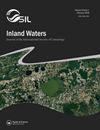Modelling prolonged stratification and hypoxia in dryland river waterholes during drought conditions
IF 2.3
3区 环境科学与生态学
Q1 LIMNOLOGY
引用次数: 0
Abstract
ABSTRACT Dryland river waterholes provide critical habitat and serve as refugia for aquatic animals during droughts, but the quality of these waterholes can often be severely compromised by hypoxic conditions that can lead to mass fish kills and loss of biodiversity. To assist river management, we developed a waterhole-scale ecohydrology model representing thermal stratification and dissolved oxygen regimes during prolonged drought periods in northern Murray-Darling Basin dryland rivers in Queensland, Australia. Model development focused around 6 typical waterholes in these rivers that were shallow (<5 m deep), highly turbid, and stratified with low dissolved oxygen. The model simulations utilised regional climate corrected for local factors such as diurnal vegetation shading and wind sheltering and successfully reproduced the prolonged stratification and hypoxia measured during drought conditions. The simulations highlight the distinct local climate each waterhole experiences due to the combined effects of river morphology and canopy cover that provide various degrees of solar shading and wind sheltering. The model can serve as a tool to inform water management decisions and climate adaptation strategies. Example scenarios demonstrate that (1) even where the canopy shading effect was small (5% at one site), further loss of riparian vegetation could increase temperature by 2–4 °C in warmer months with prolonged stratification; and (2) under an example RCP 8.5 climate change scenario, water temperature is likely to increase 2–10 °C, and oxygen saturation will decrease by 10% to 20% in the middle layers for most of the no-flow period by 2080–2099.模拟干旱条件下旱地河流水孔的长时间分层和缺氧
本文章由计算机程序翻译,如有差异,请以英文原文为准。
求助全文
约1分钟内获得全文
求助全文
来源期刊

Inland Waters
LIMNOLOGY-MARINE & FRESHWATER BIOLOGY
CiteScore
6.10
自引率
9.70%
发文量
34
审稿时长
>12 weeks
期刊介绍:
Inland Waters is the peer-reviewed, scholarly outlet for original papers that advance science within the framework of the International Society of Limnology (SIL). The journal promotes understanding of inland aquatic ecosystems and their management. Subject matter parallels the content of SIL Congresses, and submissions based on presentations are encouraged.
All aspects of physical, chemical, and biological limnology are appropriate, as are papers on applied and regional limnology. The journal also aims to publish articles resulting from plenary lectures presented at SIL Congresses and occasional synthesis articles, as well as issues dedicated to a particular theme, specific water body, or aquatic ecosystem in a geographical area. Publication in the journal is not restricted to SIL members.
 求助内容:
求助内容: 应助结果提醒方式:
应助结果提醒方式:


